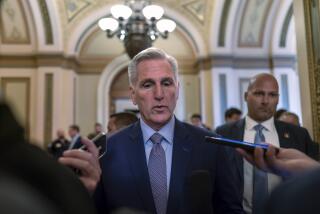Banking Bills Bogged Down in Congress : Legislation: Debate centers on whether the final versions should be limited to funding the thrift cleanup or include nationwide banking.
WASHINGTON — Congressional efforts to shore up the banking and thrift industries were in disarray Wednesday with little progress made on bills to funnel over $150 billion to banks and savings and loans.
The House Banking Committee moved ahead with a bill that would give the Resolution Trust Corp. another $80 billion to finish the thrift cleanup, doubling its costs to date.
But many lawmakers said the thrift measure already is doomed by fights over how to finance the cleanup. They predicted that it will be replaced later by a stop-gap money bill.
In the Senate, Banking Committee Chairman Donald Riegle (D- Mich.) tried with little success to revive a sweeping bank package that contains an urgently needed $70-billion loan to the Bank Insurance Fund, which pays off depositors at failed banks.
He was unable to patch together a compromise bill by Wednesday evening.
The White House said it is committed to a bank bill that includes nationwide banking. That “would provide real banking reform,” it said in a policy statement.
Its remaining hope for nationwide banking lies with the Senate, since the House on Thursday votes on a restricted bank bill that contains only money to replenish the bank insurance fund and some regulatory reforms.
The White House said it would support the House version and try to add nationwide banking later.
Sen. Jake Garn, a Utah Republican, predicted that the Senate would agree to allow coast-to-coast branching.
The major stumbling block on the Senate side is bank expansion into the insurance business, he said.
The Senate bill now forbids banks from using states such as Delaware, which has liberal insurance sale laws, as a launching pad to sell or underwrite products nationwide.
The ban outraged Delaware senators. Republican Sen. William Roth called it a protectionist measure for the powerful insurance agents’ lobby. He has drafted about seven insurance amendments, which aides say could easily derail the bank bill.
Back-room talks continued Wednesday night on the issue.
Several banking lobbyists were glum over prospects that differences could be papered over.
“Major trouble is brewing in the Senate. There are implacable lobbies facing off against each other,” said Ken Guenther, executive vice president of the Independent Bankers Assn. of America, which represents small-town banks.
These are the same lobbies that helped cause collapse of sweeping bank reform twice in the House.
The powerful insurance agents so far have won their battle in the Senate to limit bank expansion into their business and want to ensure a compromise bill preserves that.
Big banks have won their battle to slash from the Senate bill a requirement that banks offer low-cost services to poor people. That has caused community bankers and the American Assn. of Retired Persons to withdraw support.
Community bankers also have joined hands with state legislators to fight nationwide banking, permitted in three years under the Senate bill. They fear that big banks will gobble up small banks, leaving local credit needs unmet.
This is the thicket Riegle is trying to work his way through. It is little better in the House.
Lawmakers were maneuvering yet again Wednesday to attach special-interest provisions to a limited bill House Banking Committee approved, its third attempt at a bank bill.
Rep. John Dingell (D-Mich.), who commands about 40 votes, may try to shut the door on further bank expansion into securities.
More to Read
Get the L.A. Times Politics newsletter
Deeply reported insights into legislation, politics and policy from Sacramento, Washington and beyond. In your inbox three times per week.
You may occasionally receive promotional content from the Los Angeles Times.









